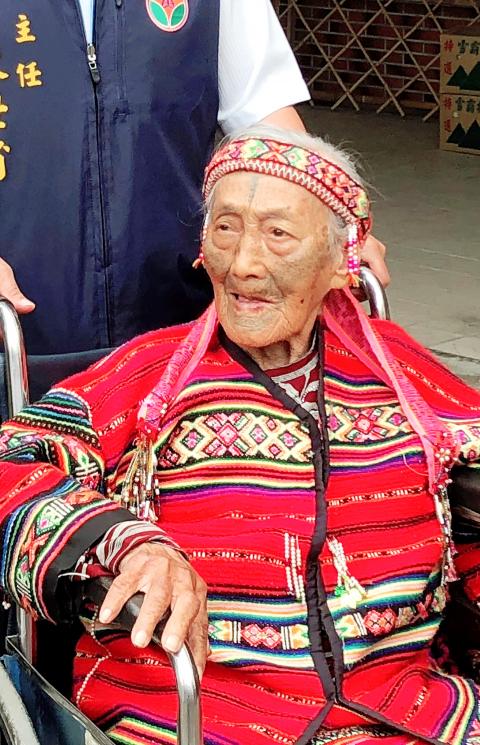Lawa Toyu, the last Atayal elder with a traditional facial tattoo, passed away early yesterday morning after her health deteriorated since being hospitalized in January with pneumonia. Doctors said that the cause of death was multiple organ failure.
Council of Indigenous Peoples Minister Icyang Parod expressed his condolences and said that the council would help with the funeral.
Despite Miaoli County records showing that Lawa Toyu was born in 1923, her fellow villagers said she delayed reporting her household registry information by five years.

Photo: CNA
Atayal facial tattoos were recognized in 2016 by the Miaoli County Government as a cultural asset.
The county collaborated with Lawa Toyu and Chien Yu-ying (簡玉英), another Atayal elder, to make the documentary Marks of Glory — The Facial Tattoos of the Atayal (榮耀的印記─泰雅文面).
Lawa Toyu became the last Atayal with facial tattoos after Chien died early last year.
The tattoos represent the purity of the tribe and are a mark of coming of age or bravery. They are also believed to allow the spirits of the deceased to cross the Rainbow Bridge to join their ancestors.
Miaoli County Councilor Huang Yueh-e (黃月娥), an Atayal, said that facial tattoos for Atayal women also meant that they knew how to weave and were “eligible to marry.”
The practice was stopped during the Japanese colonial era, Huang said, adding that with the passing of Lawa Toyu, “I feel that part of my culture is lost.”
While Lawa Toyu recognized that she was one of the few remaining from a bygone era and the cultural significance of the tattoos, she did not wish for her children or their children to undergo the process, because it was painful.
In the documentary, she said the process took an entire day and her face bled and became swollen.
“We are those who have truly lived by the Atayal traditions. The younger generations who can write must record this tradition, do not forget... Once we are gone, there will be no one else with facial tattoos,” Lawa Toyu said in the film. “Without written history, our Atayal progeny will become indistinguishable from the Han people.”
Following Lawa Toyu’s passing, Lin Chi-mei (林智妹), a Sediq who lives in Hualien, is said to be the only Aborigine with a traditional facial tattoo in Taiwan.

Alain Robert, known as the "French Spider-Man," praised Alex Honnold as exceptionally well-prepared after the US climber completed a free solo ascent of Taipei 101 yesterday. Robert said Honnold's ascent of the 508m-tall skyscraper in just more than one-and-a-half hours without using safety ropes or equipment was a remarkable achievement. "This is my life," he said in an interview conducted in French, adding that he liked the feeling of being "on the edge of danger." The 63-year-old Frenchman climbed Taipei 101 using ropes in December 2004, taking about four hours to reach the top. On a one-to-10 scale of difficulty, Robert said Taipei 101

A preclearance service to facilitate entry for people traveling to select airports in Japan would be available from Thursday next week to Feb. 25 at Taiwan Taoyuan International Airport, Taoyuan International Airport Corp (TIAC) said on Tuesday. The service was first made available to Taiwanese travelers throughout the winter vacation of 2024 and during the Lunar New Year holiday. In addition to flights to the Japanese cities of Hakodate, Asahikawa, Akita, Sendai, Niigata, Okayama, Takamatsu, Kumamoto and Kagoshima, the service would be available to travelers to Kobe and Oita. The service can be accessed by passengers of 15 flight routes operated by

Taiwanese and US defense groups are collaborating to introduce deployable, semi-autonomous manufacturing systems for drones and components in a boost to the nation’s supply chain resilience. Taiwan’s G-Tech Optroelectronics Corp subsidiary GTOC and the US’ Aerkomm Inc on Friday announced an agreement with fellow US-based Firestorm Lab to adopt the latter’s xCell, a technology featuring 3D printers fitted in 6.1m container units. The systems enable aerial platforms and parts to be produced in high volumes from dispersed nodes capable of rapid redeployment, to minimize the risk of enemy strikes and to meet field requirements, they said. Firestorm chief technology officer Ian Muceus said

MORE FALL: An investigation into one of Xi’s key cronies, part of a broader ‘anti-corruption’ drive, indicates that he might have a deep distrust in the military, an expert said China’s latest military purge underscores systemic risks in its shift from collective leadership to sole rule under Chinese President Xi Jinping (習近平), and could disrupt its chain of command and military capabilities, a national security official said yesterday. If decisionmaking within the Chinese Communist Party has become “irrational” under one-man rule, the Taiwan Strait and the regional situation must be approached with extreme caution, given unforeseen risks, they added. The anonymous official made the remarks as China’s Central Military Commission Vice Chairman Zhang Youxia (張又俠) and Joint Staff Department Chief of Staff Liu Zhenli (劉振立) were reportedly being investigated for suspected “serious